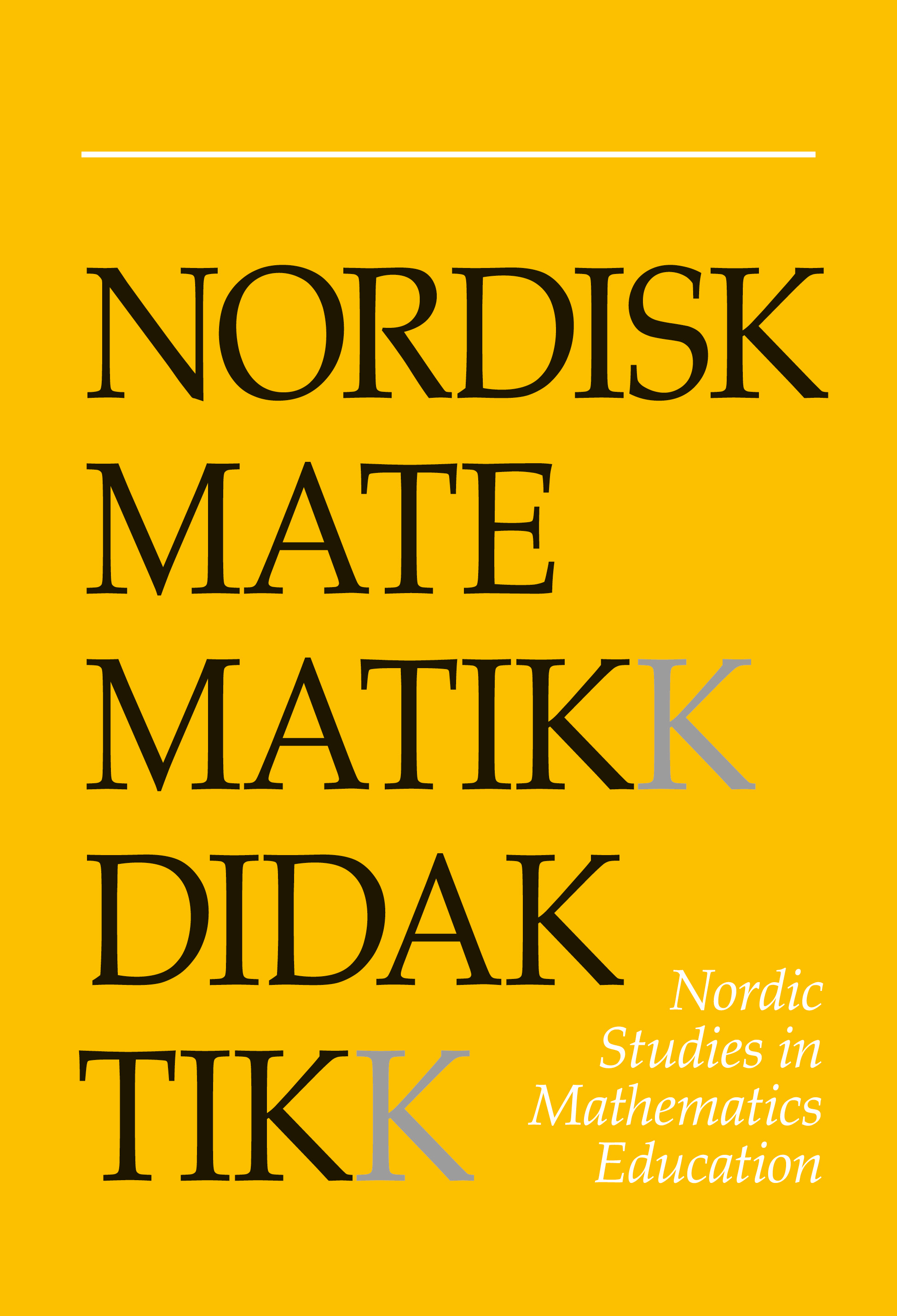Gender comparisons of pupils' self-confidence in mathematics learning
DOI:
https://doi.org/10.7146/nomad.v10i3-4.147166Abstract
The paper analyzes pupils' self-confidence in mathematics, which involves pupils' mathematical beliefs about themselves, and beliefs about achievement in mathematics, in Finnish elementary school. The research described consists of a survey on mathematical beliefs of about 3000 fifth-graders and seventh-graders. Results showed that mathematical beliefs about oneself could be divided, based on the indicator used, into three factors: self-confidence, success orientation, and defense orientation. The fifth-graders had higher self-confidence than the seventh-graders. Additionally, boys in both grades had remarkably higher self-confidence in mathematics than girls.
References
Bohlin, C. F. (1994). Learning style factors and mathematics performance: sex- related differences. International Journal of Educational Research, 21 (4), 387- 398. https://doi.org/10.1016/S0883-0355(06)80027-3
Chapman, J. W., Tunmer, W. E. & Prochnow, J. E. (2000). Early reading- related skills and performance, reading self-concept and the development of academic self-concept: a longitudinal study. Journal of Educational Psychology, 67, 145-152 https://doi.org/10.1037/0022-0663.92.4.703
Crater, G. & Norwood, K. (1997). The relationship between teacher and student beliefs about mathematics. School Science & Mathematics, 2, 62-67. https://doi.org/10.1111/j.1949-8594.1997.tb17344.x
Fennema, E. & Sherman, J. A. (1976). Fennema-Sherman mathematics attitudes scales. JSAS Catalog of Selected Documents in Psychology, 6, 31 (Ms. No. 1225).
Frost, L. A., Hyde, J. S. & Fennema, E. (1994). Gender, mathematics performance, and mathematics related attitudes and affect: a meta-analytic synthesis. International Journal of Educational Research, 21 (4), 373-385. https://doi.org/10.1016/S0883-0355(06)80026-1
Hannula, M. S. (2004). Affect in mathematical thinking and learning. Annales Universitatis Turkuensis (Ser. B, Tom. 273). Faculty of Education, University of Turku.
Hannula, M. S. & Malmivuori, M. L. (1997). Gender differences and their relation to mathematics classroom context. In. E. Pehkonen (Ed.), Proceedings of the 21st Conference of the International Group for the Psychology of Mathematics Education (Vol 3, pp. 33-40). University of Helsinki.
Hannula, M. S., Maijala, H., Pehkonen, E. & Soro, R. (2002). Taking a step to infinity: student's confidence with infinity tasks in school mathematics. In S. Lehti & K. Merenluoto (Eds.), Third European Symposium on Conceptual Change - A Process Approach to Conceptual Change (pp. 195-200). Faculty of Education, University of Turku.
Hembree, R. (1990). The nature, effects, and relief of mathematics anxiety. Journal for Research in Mathematics Education, 21 (1), 33-46. https://doi.org/10.2307/749455
House, J. (2000). Student self-beliefs and science achievement in Ireland: findings from the third international mathematics and science study (TIMMS). International Journal of Instructional Media, 27 (1), 107-115.
Leder, G. (1995). Equity inside the mathematics classroom: fact or artifact? In W. G. Secada, E. Fennema & L. B. Adaijan (Eds.), New directions for equity in mathematics education. Cambridge University Press.
Lester, F. K., Garofalo, J. & Kroll, D. L. (1989). Self-confidence, interest, beliefs, and metacognition: key influences on problem-solving behavior. In D. McLeod & V. Adams (Eds.), Affect and mathematical problem solving (pp. 75- 88). New York: Springer-Verlag. https://doi.org/10.1007/978-1-4612-3614-6_6
Linnanmäki, K. (2002). Matematikprestationer och självuppfattning, en uppföljninggsstudie I relation till skolspråk och kön. [Mathematical proficiency and self-concept; a longitudinal study with an attention to language and gender]. Åbo Akademi University Press.
Maijala, H. (2004). How does classroom teaching in mathematics look like in Finland? Submitted to Educational Studies in Mathematics.
Malmivuori, M.-L. & Pehkonen, E. (1996). Mathematical beliefs behind school performances. In L. Puig & A. Gutierrez (Eds.), Proceedings of the 20th PME Conference (Vol. 3, pp. 305-311). University of Valencia.
Minkkinen, J. (2001). Lyhyttä vai pitkää matematiikkaa? Tutkimus tyttöjen ja poikien lukion matematiikkavalinnan perusteluista ja valintaan yhteydessä olevista tekijöistä [General or advanced mathematics? A study on reasons behind girls' and boys' mathematics selection and on connected factors] (master's thesis). Department of Teacher Education, University of Turku.
Pehkonen, E. (1997). Learning results from the viewpoint of equity: boys, girls and mathematics. Teaching Mathematics and its Applications, 16 (2), 58-63. https://doi.org/10.1093/teamat/16.2.58
Philippou, G. & Christou, C. (1997). A study of teachers ́ conceptions about mathematics. In. E. Pehkonen (Ed.), Proceedings of the 21st Conference of the International Group for the Psychology of Mathematics Education (Vol 4, pp. 9-16). University of Helsinki.
Schoenfeld, A. (1992). Learning to think mathematically: problem solving, metacognition and sense making in mathematics. In A. D. Grows (Ed.), Handbook of research on mathematics learning and teaching (pp. 334-370). New York : Macmillan.
Stipek, D. & Gralinski, H. (1991). Gender differences in children's achievement-related beliefs and emotional responses to success and failure in mathematics. Journal of Educational Psychology, 83 (3), 361-371. https://doi.org/10.1037/0022-0663.83.3.361
Stuart, V. (2000). Math curse or math anxiety? Teaching Children Mathematics, 6 (5), 330-335. https://doi.org/10.5951/TCM.6.5.0330
Tartre, L. & Fennema, E. (1995). Mathematics achievement and gender: a longitudinal study of selected cognitive and affective variables. Educational Studies in Mathematics, 28, 199-217. https://doi.org/10.1007/BF01274173
Vanayan, M., White, N., Yuen, P. & Teper, M. (1997). Beliefs and attitudes toward mathematics among third- and fifth-grade students: a descriptive study. School Science & Mathematics, 97 (7), 345-351. https://doi.org/10.1111/j.1949-8594.1997.tb17375.x
Downloads
Published
How to Cite
Issue
Section
License

This work is licensed under a Creative Commons Attribution-NonCommercial-ShareAlike 4.0 International License.



